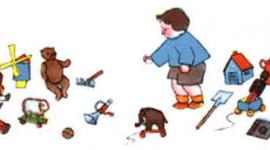Three-Stage Discipline Plan

One of the constant problems parents face is getting children to do what needs to be done. Life requires that certain things be accomplished in a timely fashion. Children must get up, get dressed, eat, take care of basic grooming, take care of responsibilities, and participate in the chores of family living. If getting kids to do what must be done becomes a struggle, family life becomes a major hassle.
I believe that a major goal of parenting is to gain the child's cooperation. Ultimately, the child must tell himself what to do. I also believe that children need to know that they must do what is required. But children are different and situations are different. It's not an either-or situation.
The following Three Stage Discipline Plan is offered as a way to make sense of the options parents have in working with their children.
Three Stage Discipline Plan: Stage One
Stage I: Encourage the right response.
- We can see what needs to be done and we want the child to tell himself what to do. We describe the situation or problem as we see it. The next step is to back off and let the child decide what needs to be done. "It is bedtime," not "Go brush your teeth and get ready for bed." Children blossom when they are allowed to tell themselves what needs to be done.
- Sometimes we need to clarify the information if the situation is not obvious to the child. "Your wet towel is on the carpet. Wet towels can cause the carpet to mildew," instead of "Can't you ever remember to hang up your towel!"
- Children need reminders but the reminders need to be kind. Children do forget and it takes years to develop the habits we take for granted. One word is often enough. "Bedtime." "Towel." Written notes are also useful, especially with children who are visual learners and do not remember what they hear.
Discipline Plan Stage Two
Stage II: The parents must give an order; but first, they must know what they will do if the kids don't respond.
Stage II is for children who are beyond encouragement, who don't respond to the opportunity to tell themselves. In Stage II, parents must think first about the consequences for non-compliance and then give the order.
- Explain exactly what we want the child to do. "I want you to or I need you to ...."
- The second step is to back off and give the child a chance to comply. If we stand over the child, we are inviting a contest of wills.
- The third step is to recognize compliance. "Thank you for doing that." We can thank a child for being responsible, for being respectful, for cooperating. A child's obedience should not be taken for granted.
Discipline Plan Stage Three
Stage III: For children who choose to defy their parents.
The parents must take over. All children try it at least sometimes. Some children seem to spend their entire childhood testing all the boundaries. Stage III may be a constant state for parents of such a child.
- Give the child who fails to respond to a Stage I or Stage II request two choices: compliance or consequences.
- First, parents specify exactly what will happen for non-compliance.
- Then the child is given the last opportunity to act.
- If the child finally decides to comply, the child is told, "You made a good choice."
- If the child fails to do what is expected, enforce the consequences.
Don't allow a child to manipulate the situation at this point. The consequences have been set and should be carried out. If the child argues or begs and pleads, don't listen. This is not the time to feel sorry for your child.
- Children must experience the consequences of their actions, of their choices.
Consequences should be reasonable and related to the incident. If a child doesn't like the consequences, the parent has found the right one.
Mistakes to Avoid in Any Discipline Plan
- Expectations that are too high.
One mistake is setting expectations that are too high or unrealistic. Children can only be expected to do what they are capable of doing. Books on child development can help parents figure out if their expectations are in line with the child's capabilities.
- Beginning at Stage III
Jumping to a Stage III response immediately every time something needs to be done -- big mistake. We want to foster respect, responsibility, cooperation and self-esteem in our children. Perpetual Stage III parenting undermines those attributes and leads to very defiant children.
- Verbal abuse.
The greatest mistake is using methods that cause permanent damage to our children. Emotional abuse may be even more disastrous than physical abuse. Nagging, threatening, pleading, screaming demean the parent. Humiliation, name-calling, and inducing guilt demean the child. Neither are necessary.
Life would be simple if children did everything we asked, but that is not reality. Parenting is often hard work. With a difficult child, it is ALWAYS hard work. With the techniques in Stage I, II, or III of this discipline plan, it may be a bit easier.
APA Reference
Gibson, E.
(2022, January 17). Three-Stage Discipline Plan, HealthyPlace. Retrieved
on 2026, March 3 from https://www.healthyplace.com/parenting/challenge-of-difficult-children/three-stage-discipline-plan



